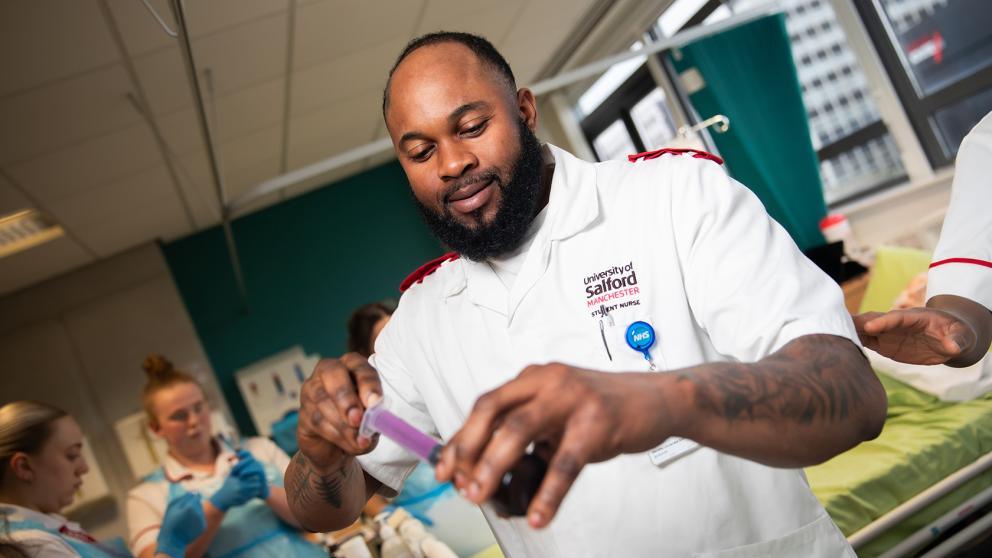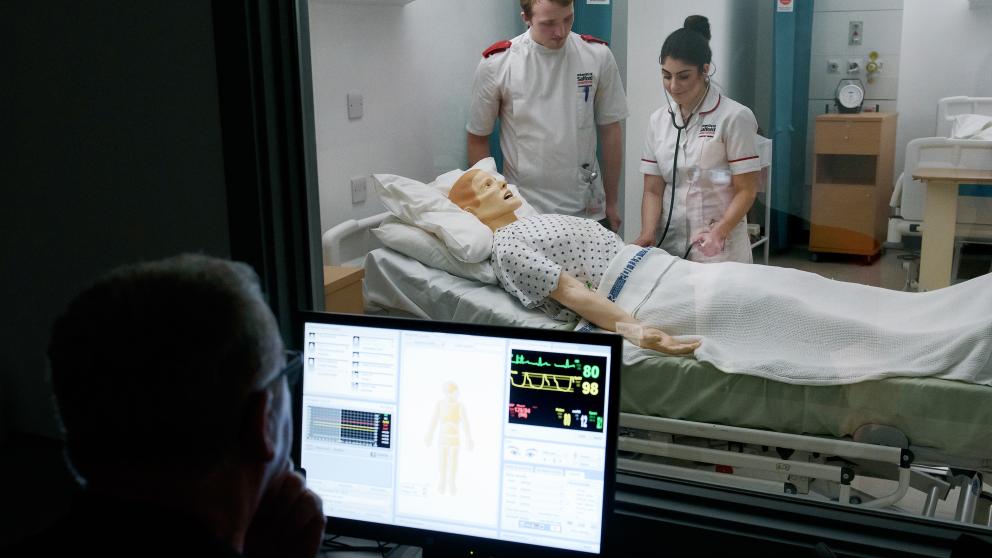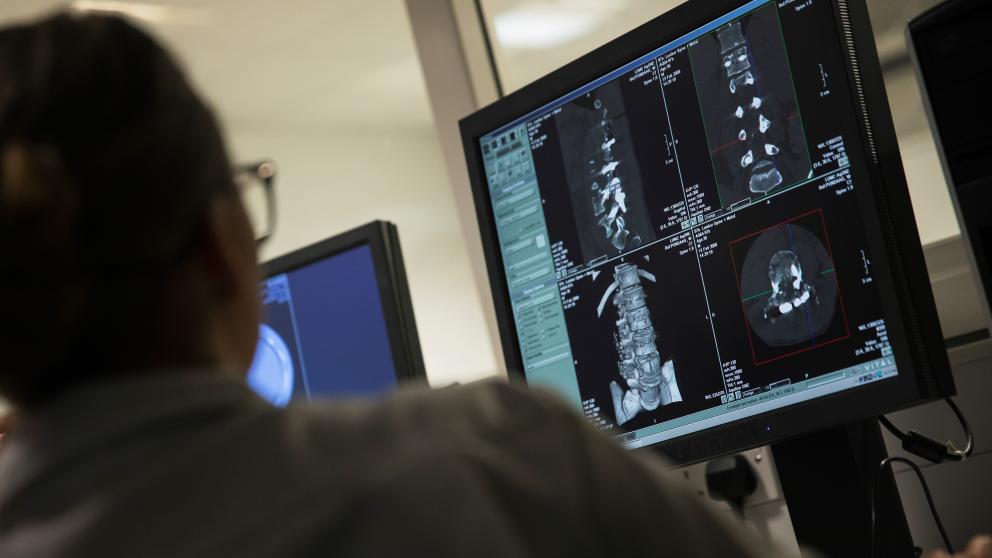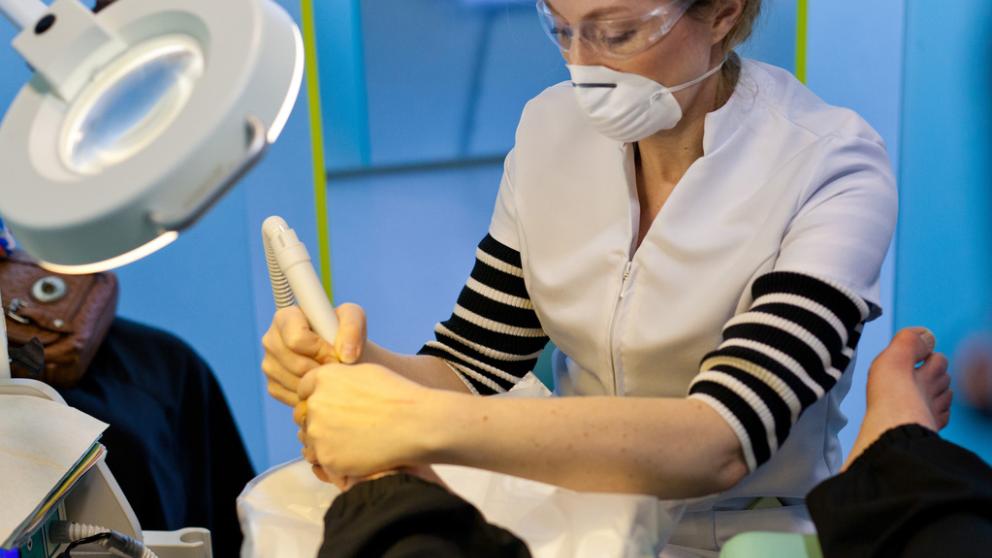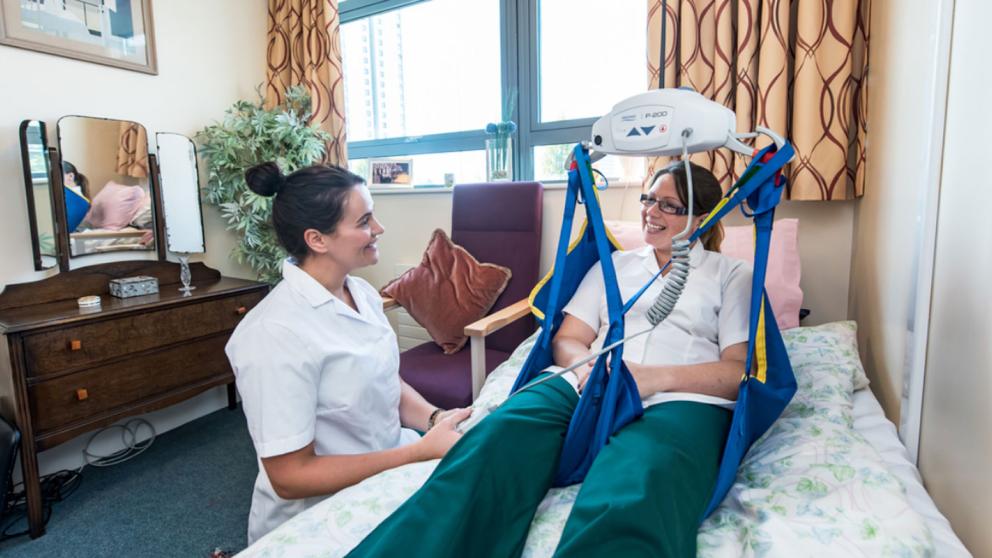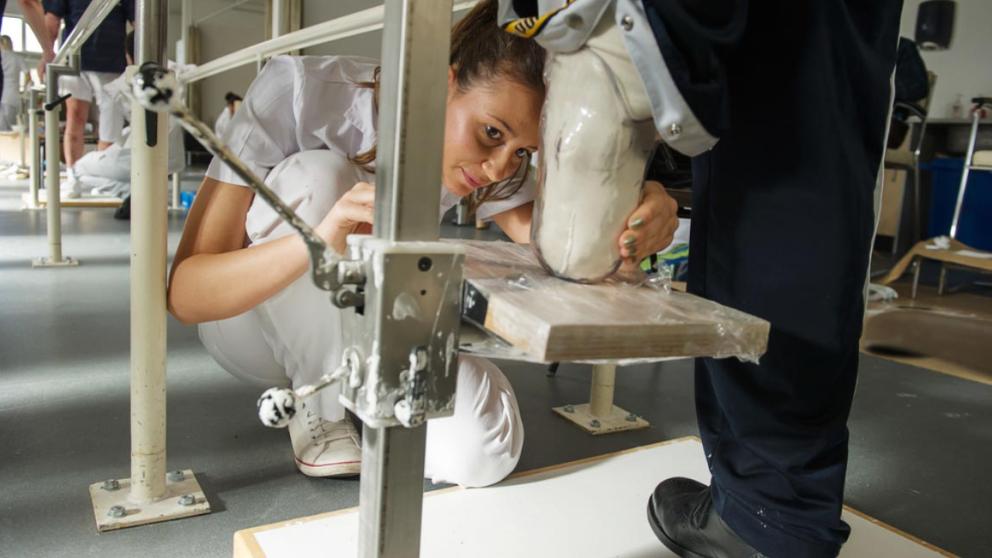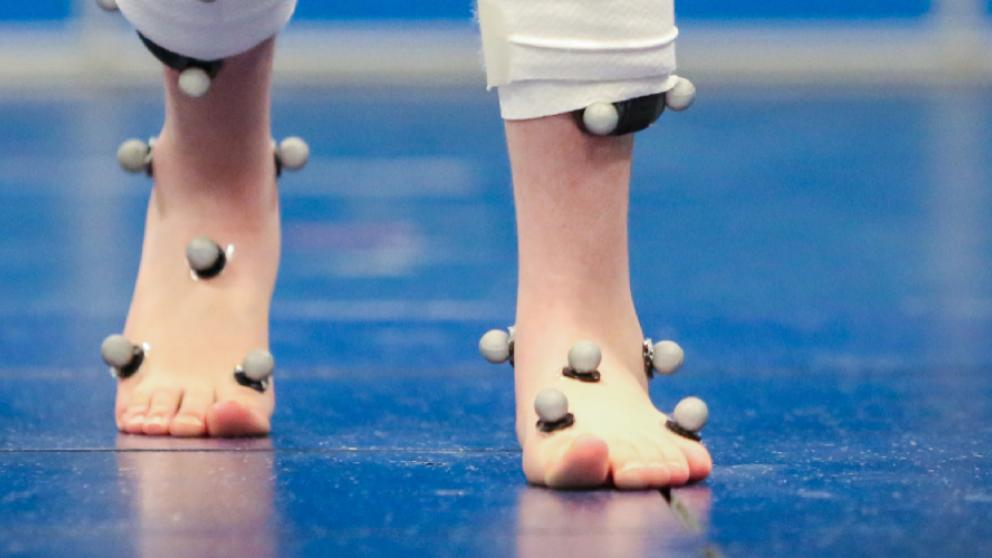Develop your healthcare career at Salford
Studying a healthcare-related degree is a hands-on, dynamic way of learning that will give you experience like no other. During your studies, you’ll complete placements, meet other specialists and get a taste for what the role’s really like.
The School of Health and Society at the University of Salford is a forward-thinking, dynamic school with a commitment to lifelong learning and real-world impact. Expert teaching staff, strong industry links and excellent facilities equip students with the knowledge and experiences to advance their research or career.
Combining innovative teaching with hands-on skills development, we offer programmes to help whether you are looking to change direction or specialise in a certain field your healthcare career across a range of subject areas, including Midwifery, Nursing, Occupational Therapy, Physiotherapy, Podiatry, Prosthetics and Orthotics, and Radiography.
Contact our enquiries team if you have any questions about applying to study at the University of Salford.
Explore Careers in Nursing and Social Care
Midwife
Midwives offer care and support to birthing people, their partners and families. They provide care throughout the pregnancy continuum which includes antenatal, intrapartum and postpartum care.
Equality and diversity is important for providing high-quality care for birthing persons and their families. Within our midwifery programmes we aim to provide a truly inclusive curriculum, recognising and valuing difference in broadest sense. We also strive to ensure all our midwifery students feel valued and included.
Our students have 100% employment rates on qualification both in local maternity services and across the UK including the Channel Islands and Isle of Man. Most of our students on qualification work as midwives in hospital and or the community setting or working in continuity of care teams providing care to a small caseload of women.
Want to find out more? Visit our Midwifery Course Page
Adult Nurse
On this course you will experience the realities of contemporary 24-hour service provision when caring for adult patients across all aspects of the health/ill health continuum.
50% of your studies will be spent in hospital and community settings, within the NHS and independent sector which includes prison placements, where you will spend time in a well-supported environment, working alongside qualified practice assessors and supervisors.
When attending the University you will be welcomed into a relaxed and friendly environment in which to learn. A wealth of facilities are available to you including formal teaching, group and one-to-one sessions, a comfortable and enriching learning space, and state-of-the-art clinical set ups with child, infant and adult simulators.
As a graduate and qualified staff nurse in your chosen field of practice you will be able to apply for a job in either an acute setting such as a hospital or in the community. You may want to work within the NHS or in the public and private sectors for example, a ward, a health centre, a prison, a care home or a hospice.
Want to find out more? Visit the course page
Children and Young People's Nurse
Children and young people’s nurses work in a variety of clinical settings and provide care, support, advice and education to 0-18 year old children, young people and their parents/ carers. You will learn how to manage and maximise the health of children and young people in a hospital or in the community.
50% of your studies will be spent in hospital and community settings, within the NHS and independent sector, where you will spend time in a well-supported environment, working alongside qualified practice assessors and supervisors.
When attending the University you will be welcomed into a relaxed and friendly environment in which to learn. A wealth of facilities are available to you including formal teaching, group and one-to-one sessions, a comfortable and enriching learning space, and state-of-the-art clinical set ups with child, infant and adult simulators.
Want to find out more? Visit our course page here.
Mental Health Nurse
Mental health nurses provide care for people experiencing mental health problems, working in the community, specialist hospitals or health centres.
50% of your studies will be spent in hospital and community settings, within the NHS and independent sector which includes prison placements, where you will spend time in a well-supported environment, working alongside qualified practice assessors and supervisors.
You will learn about how to support people during the most acute phases of their distress, how to work with people who have issues around substance misuse or offending behaviour and how to help those with ongoing mental health problems.
When attending the University you will be welcomed into a relaxed and friendly environment in which to learn. A wealth of facilities are available to you including formal teaching, group and one-to-one sessions; all provided within a comfortable and enriching learning space.
Want to find out more? Visit our course page.
Learning Disabilities Nurse
This exciting and innovative course offers you the opportunity to study for, and to register as, both a Nurse (Learning Disabilities) and a Social Worker (Generic). You will gain the professional qualifications required as well as the knowledge, skills and experience required for working in health and social care settings, primarily with people who have learning disabilities, though placements in other social care settings meet the needs of a generic Social Work qualification.
This course incorporates all the requirements of study for the generic social work and registered nurse in learning disabilities qualifications. It recognises that people with learning disabilities may have health and social care needs that require differing levels of support and intervention. An emphasis is placed on the empowerment, enablement and independence of people to meet these needs within their own communities.
Want to find out more? Visit the course page.
Nursing Associate
Our FdSc Nursing Associate programme will train you to provide effective, safe, and responsive nursing care across various healthcare and social care settings. This crucial role bridges the gap between support workers and registered nurses, contributing to a strong healthcare workforce for the future.
Nursing associates work both independently and as vital members of healthcare teams, delivering hands-on care in primary, secondary, community, and social care settings. Their focus is on ensuring patients receive compassionate care across diverse fields of practice, including physical and mental health.
The main pathway to becoming a nursing associate is through enrolling in a Nursing and Midwifery Council (NMC) approved programme, typically a two-year direct entry foundation year undergraduate degree or degree apprenticeship. Qualified nursing associates can also go on to train as a registered nurse by putting their training towards a shortened nursing degree or registered nursing degree apprenticeship.
Want to find out more? Visit our direct entry course page, or visit our degree apprenticeship course page.
Social Worker
Our BSc (Hons) in Social Work provides cutting-edge approaches to teaching and learning. By engaging you in a critical and meaningful approach to practice, the course will provide you with the knowledge, values and skills needed to begin to recognise and address some of the most difficult social problems facing individuals, communities and societies today.
This course comprises periods of academic study and practice learning in a social work or social care setting. These practice learning opportunities enable you to safely apply and develop the learning that has been advanced in practice.
We are extremely proud that our course is ranked in The Guardian University Guide 2023 within the top 10 for the UK.
Want to find out more? Visit the course page.
Counsellor or Psychotherapist
This course offers you the opportunity to graduate as a highly skilled professional counsellor, with many exciting and rewarding career paths open to you. The course meets the training requirements for professional registration with the British Association for Counselling & Psychotherapy (BACP), and opens the progression route to individual BACP accreditation.
The course is structured around modules that deliver professional training components, and that broaden and deepen your understanding of counselling-related issues. You will develop your competence in working with the person-centred counselling approach, and you will develop a wide range of professional skills, including communication, reflective practice and self-awareness, research skills, mindfulness and cognitive behavioural therapy (CBT).
Counselling and psychotherapy offers rewarding and diverse career opportunities. While some counsellors find employment in a single role, many develop portfolio careers that mix different types of employment in a number of sectors, such as in community health agencies, schools and as private therapists.
Want to find out more? Visit the course page.
Explore Careers in Allied Health Professions
Physiotherapist
This degree, accredited by the Chartered Society of Physiotherapy, equips you with the knowledge and skills required by physiotherapists to provide evidence-based health care. Our physiotherapy graduates have excellent problem-solving skills, they are technically proficient, professionally aware and as such, move seamlessly into graduate practice - in short, they are very employable. The course benefits from dedicated and innovative teaching staff operating from purpose-built, state-of-the-art technical and learning facilities. Upon graduation, you are eligible to become a member of the Chartered Society of Physiotherapy and apply to be placed on the Health and Care Professions Council’s (HCPC) Register of Physiotherapists.
We are extremely proud that our course is ranked in The Guardian University Guide within the top 20 in the UK, and number 1 in the North West.
This course received a 100% overall student satisfaction rate in the most recent National Student Survey (NSS) (University of Salford analysis of unpublished NSS 2022 data).
Through the programme, you will have developed key employability skills e.g. skills of enquiry, critical thinking, problem-solving and reflection. You will leave the programme with an extensive portfolio to demonstrate these skills and your CPD. You will be well prepared for the application process to successfully gain employment in a variety of roles in physiotherapy and other health and well-being related fields and/or further study.
Want to find out more? Visit our course page.
Podiatrist
Podiatry is the assessment, diagnosis and treatment of foot and lower limb disorders, many of which are caused by general health disorders. You will use comprehensive assessment and diagnostic skills to develop patient care pathways for conditions which impact on people's quality of life.
You'll learn from academics internationally renowned for their clinical expertise and research profile. You'll have the opportunity to take exciting placements in NHS clinics, as well as learning hands-on in our state-of-the-art, purpose-built clinical research facilities.
You will start your clinical practice within six weeks of starting the course within our own in-house clinic. Your practice will develop throughout your time with us, one day per week in NHS clinics and then during longer periods of work placements in your final year.
At Salford, we have our own on-campus professionally equipped podiatry clinic and human movement laboratory where you will regularly put your learning into practice. The course has strong links to NHS clinics across the north-west of England, enabling you to experience real working conditions during your extensive placements.
Want to find out more? Visit the course page.
Prosthetists or Orthotists
Prosthetists provide artificial limbs to assist people who have part or all of a limb missing. Orthotists provide braces and splints to support, correct, or aid the function of people with various conditions of the neurological, muscular and skeletal systems. On this course you will learn how to assess and treat people requiring prosthetic and orthotic care. Prosthetists and Orthotists are highly skilled in biomechanics, human movement and gait analysis. The strong practical elements of this course will be taught in conjunction with relevant theory and background information.
We are one of the only two universities in the UK offering this course.
This course offers the opportunity to learn through placements in prosthetic and orthotic clinics across the country. As you move through the course, you will gradually undertake a greater depth of learning and increase your competency in dealing with people, meeting their needs and deciding on the most effective treatments to offer.
Want to find out more? Visit our course page.
Diagnostic Radiographer
Accredited by the Society and College of Radiographers, this course will equip you with the skills to be a highly professional radiographer. Radiography combines science, technology and patient care to provide a vital role in patient diagnosis and treatment. Radiographers use a range of different imaging techniques and sophisticated technology to produce high quality images to aid diagnosis for injury or disease as part of the multi-professional healthcare team. The career structure provides opportunities for radiographers to specialise into many areas including ultrasound, CT/MRI scanning, image reporting, teaching and management.
We are proud to be in the top 10 for Radiography in The Sunday Times Good University Guide League Table 2022.
When you complete the degree you will be eligible to register with the Health and Care Professions Council (HCPC) as a qualified diagnostic radiographer, which allows you to work in the NHS, the private sector and many countries abroad. There are also opportunities in education, industry and research.
Want to find out more? Visit the course page.
Occupational Therapist
As an occupational therapist, you'll work with people from a wide range of backgrounds and cultures and across all age groups, helping them to live with a variety of physical and psychological problems. You'll work with your clients to consider how their physical health, mental health and social environment affect their ability to carry out daily living activities such as personal care, domestic tasks, socialising, leisure and work.
An integral part of your learning will be provided by a series of five supervised placements amounting to over 1,000 hours in health and social care settings. These placements include hospital settings and community services. Most of our placements are currently within the Greater Manchester area.
As an occupational therapist, you will have considerable scope for career development in clinical specialities, management, research and education. Occupational therapists are employed in a range of health and social care settings, in addition to working for employers such as prisons, litigation services, voluntary organisations and private practice.
This course is approved by the Health and Care Professions Council (HCPC) and the Royal College of Occupational Therapists (RCOT).
Want to find out more? Visit the course page.
Our Students Stories

We are immensely proud of our students and their achievements when studying with us and beyond. Hear from students from a range of healthcare courses from the school of Health and Society about their experience of studying at Salford.
Get in touch
If you want to find out more about studying at undergraduate level at the University of Salford, head to our Undergraduate Study pages. Here you'll find information about fees and finance, student support, how to apply and details of upcoming Open Days.
Our friendly team will answer any questions you may have: Contact Us.
Careers in Healthcare Guide
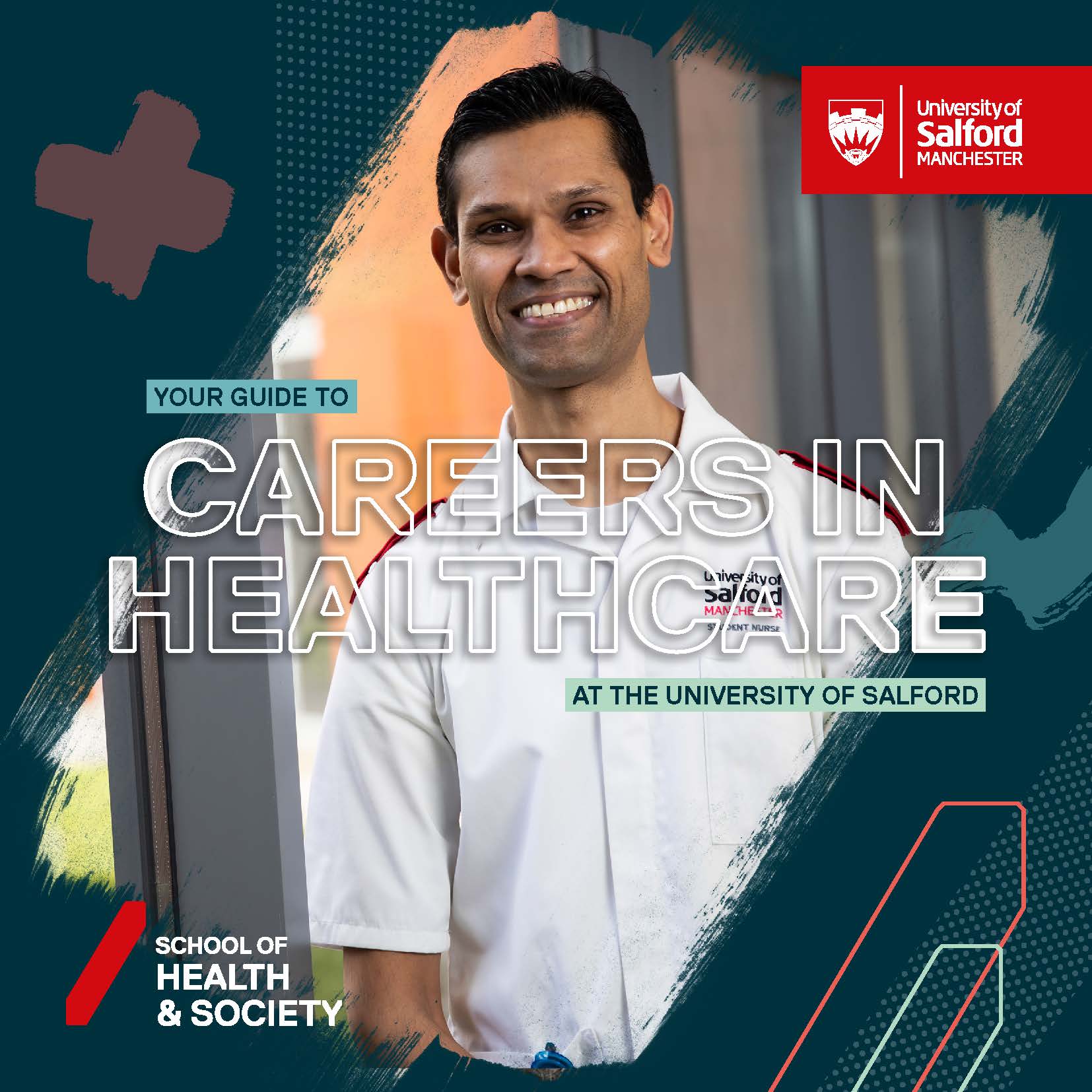
Interested in finding out more, or looking to share the wide range of career options in healthcare with your friends, family, or students?
You can view and download our Careers in Healthcare Guide to explore the various career options, the courses available to study with us, and the facilities and support available from the University.

